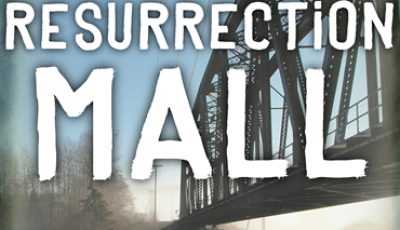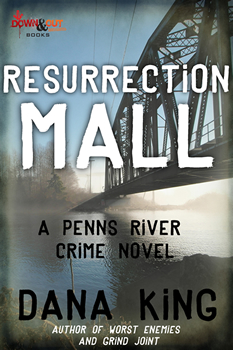

Resurrection Mall by Dana King
 By Karen Harper
By Karen Harper
I learned a lot interviewing Dana King, since he writes books that are more hard boiled than mine, but I also learned we have a lot in common. We are both drawn to small town settings where the enemy is often us—someone we know—and life is definitely not glitz and glamor. His unique career background has prepared him well for writing both long and short fiction.
Read on to learn more about his new thriller, RESURRECTION MALL.
Please tell us what your book is about.
RESURRECTION MALL is the story of a town fallen on hard times. Various solutions promise grand results, but the profits always go to a select few pockets. There seems to be no downside to a televangelist’s efforts to rebuild an abandoned shopping center into a mall that caters to religious-themed businesses, with his new church and TV studio serving as the anchors. The problem is that low-profit enterprises not only have trouble raising seed money, they often can’t afford to do the research needed to fully understand why no one else has found a good use for this location. The book is about what happens when an event totally unrelated to the mall’s construction might bring down the entire project.
Is the setting of Penns River based on a place you know or, if not, how does it work well for your story?
I grew up in Penns River. Well, the three small towns near Pittsburgh that make up my Penns River. I was struck one day about how big cities have always been well represented in crime fiction, and now writers like Daniel Woodrell are giving voice to more rural areas, but I couldn’t think of anyone writing about the problems of the towns that bridge the two, and what happens when industry leaves and never comes back to a place that lacks the population density to attract new businesses. Pittsburgh reinvented itself as a center for medicine, education, and finance, but that prosperity never seems to make it up the Allegheny River.
You have a varied career background as musician, school teacher, and systems analyst. Have any of these pursuits contributed to your writing?
Teaching has to some extent. I taught in a high school close to the border between Washington, DC and Hyattsville, MD that was 80 per cent minority. I grew up in a working class small town that had no more than half a dozen black kids out of 900 in my high school. Teaching those couple of years developed my sense of empathy, and showed how similar most people are despite superficial differences. It’s been a great help with my characters.
More than that, though, is the musical background. Besides exposing me to things and people I never would have been aware of, it developed my ear. Not only is that essential for good dialogue, but it allows me to know if I’m capturing the voice I’m looking for. There are times when I’ll replace a word the dictionary says would be more appropriate because the one I chose sounds better.
Your excellent reviews and websites describe your work as mystery and thriller. Do these two terms fit only certain of your novels, or are these book genres reflected in each of your books, especially RESURRECTION MALL?
I can’t say there’s a lot of mystery in my books. Even in my private eye novels, where the reader learns the clues as Nick Forte discovers them, Forte often solves the mystery well before the end of the book. After that it’s a matter of finding out what he’s going to do about it.
RESURRECTION MALL has a similar element. The cops have a pretty good idea who they’re looking for less than halfway through the book. The suspense lies in seeing what they can do about it, and how timely they’ll be.
There are certainly elements of noir in RESURRECTION MALL—I doubt anyone would describe the ending as happy—but I don’t really think of myself as a noir writer. I know people who disagree, so I could be wrong. To me, true noir has a bad outcome for the protagonist. Most of my stuff has a bittersweet ending for the main character, so I think of it as noir-ish. (Or gris, as my Francophile daughter and I decided one day.) My writing style is clipped and hard-boiled, which lends itself to noir, which may be what some are picking up on.
Speaking of the fascinating concept of a “religious themed mall,” did a particular place inspire that idea? I’m thinking of Kentucky’s Creation Museum or the Holyland Experience outside Orlando.
I first got the idea to “resurrect” a mall when I lived near Chicago and occasionally drove past the abandoned Dixie Square Mall in Harvey, IL, where they filmed the great chase scene in The Blues Brothers. The idea of something left for dead like that combined with the evangelical Christian concept of being born again, then placing the entire operation in an impoverished location, appealed to me.
As well as novels (including a Shamus Award), you have also written highly-praised short fiction. Do you prefer one format or the other? What (other than writing time) are the pros and cons for you of these different forms?
Sorry to disagree, but I have to set the record straight: I haven’t won any Shamuses. I have been nominated twice, each of which was a great thrill. I believe that P.I. fiction done well is the highest form of crime writing, so to have a group like the Private Eye Writers of America think that highly of my work is beyond flattering.
To your question, short stories are much harder for me. They’re in an area between writing a flash piece—which I enjoy—and a novel, which I love. The problem with short stories is that if I like a mix of idea, characters, and location enough to write five thousand words, my mind naturally keeps thinking of what happens next and pretty soon I’m outlining a novel. That’s not a problem for a flash piece, because of the natural limitations in scope of a story of fewer than a thousand words.
I find myself needing to write more short stories of late, and I have to confess, about half of them are either flash pieces that lent themselves well to expansion, or bits excised from novels that stand alone well. Even then I write on the short side for almost all my stories, around 1,500 to 2,000 words, or about the length of an average chapter in one of my novels.
You are also adept at writing a series, something I find more challenging than single title books. Are continuing characters a challenge for you or a boon, as in your Nick Forte series?
A boon, absolutely. No question. I constantly find myself watching TV or a movie and wondering, “What would Nick do here? What would Doc do?” It even happens when I’m out places. Say I’m meeting someone in a deli and I’m there first. (Which I almost always am. I’m pathologically punctual.) If I forgot to bring a book I’ll kill the time casing the joint, trying to look at it as one of my characters might.
I enjoy being in the characters’ worlds so much I crossed the two series over and brought Nick Forte to Penns River as a “guest star” in Grind Joint. I had a need for a character just like him and decided he was actually first cousins with Ben Dougherty and grew up in Penns River. It was great fun to write him in the third person to show how other people viewed him.
You have a great blog on how well the classic TV series NYPD Blue holds up over time. Why does that series still work for you, even though, as you say, the police methods are dated? Any current “cop shows” that pass your muster?
NYPD Blue holds up so well for three critical reasons. As I said in the blog, the execution is almost flawless. That goes a long way toward carrying off anything else that might show a little age.
Second is the situations the characters find themselves in. The show is largely about cops’ perspectives on interpersonal dynamics that have been true probably since before language developed. This is why shows like The Honeymooners and All in the Family are still popular. They’re about people, and people as a species don’t change that much.
From the cop angle the show continues to work because, for all the cool CSI stuff we see now, cases are still broken using much the same techniques cops use on the show: paying attention and talking to people. Fibers and DNA may seal a conviction, but someone has to catch the bad guy first. One of my proudest moments as a writer came on a Bouchercon panel a couple of years ago when Jim Born, a retired cop and that day’s moderator, inserted a comment when I gave that answer to a question, saying, “Listen to that. He’s absolutely right.” Made my day.
As for current cop shows, I have to confess that I don’t watch any. That’s not to rip them. I just don’t have time. The little bit of television I watch is spent on things that have already passed muster, either revisiting favorites of mine (The Wire, The Shield, Justified) or something else that people I trust keep telling me I really, really, really, need to see. Which is how I came to “discover” NYPD Blue a mere 22 years after it first aired.
As a busy writer, can you give other authors advice on how to balance writing time with “real life?” Any hints of getting the words on the page?
I can, but it probably won’t help. It’s a matter of butt in seat, fingers on keys. Some days are better than others, but get something done every day, even if it stinks. That’s what rewriting is for. I do five or six drafts of each book, so bad days don’t concern me that much. My idea is I won’t have bad days every time I work this section. Over time I’ll get it where I want it.
I also have two advantages a lot of writers don’t. I’m a classically trained musician and played professionally well into my thirties. Musicians are used to spending hours a day locked in small rooms practicing. The primary difference is that writing is creative and playing music is interpretive. Both activities cut you off from outside contact, so you need to be comfortable with it.
The other advantage I had, and have, is that by the time I got serious about writing I had no small children around the house. That’s not a rap on children. If my daughter were little and around when I started out as a writer, damn right I’d spend the time with her. Kids are always more important. I’ll never criticize those who can’t find time to write because they’re doing things with their kids. My luxury has been in never having to choose.
*****
 Dana King has two Shamus Award nominations, for A Small Sacrifice and The Man in the Window. His Penns River series of police procedurals includes Worst Enemies and Grind Joint, which Woody Haut, writing for the L.A. Review of Books, cited as one of the fifteen best noir reads of 2013. A short story, “Green Gables,” appeared in the anthology Blood, Guts, and Whiskey, edited by Todd Robinson. Other short fiction has appeared in Spinetingler, New Mystery Reader, A Twist of Noir, Mysterical-E, and Powder Burn Flash.
Dana King has two Shamus Award nominations, for A Small Sacrifice and The Man in the Window. His Penns River series of police procedurals includes Worst Enemies and Grind Joint, which Woody Haut, writing for the L.A. Review of Books, cited as one of the fifteen best noir reads of 2013. A short story, “Green Gables,” appeared in the anthology Blood, Guts, and Whiskey, edited by Todd Robinson. Other short fiction has appeared in Spinetingler, New Mystery Reader, A Twist of Noir, Mysterical-E, and Powder Burn Flash.
To learn more about Dana, please visit his blog, One Bite at a Time. He lives in quiet near seclusion with The Beloved Spouse.
- Kaanapali Beach Paradise by R. Barri Flowers - February 29, 2020
- Mortal Music by Ann Parker - January 31, 2020
- Always Look Twice by Elizabeth Goddard - September 30, 2019
